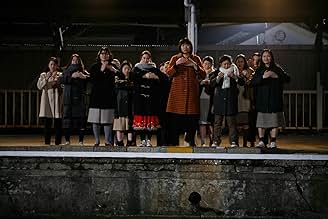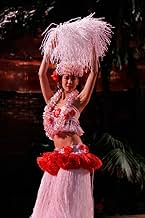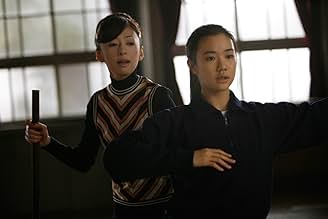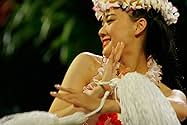IMDb RATING
7.0/10
2.3K
YOUR RATING
Young women in a small Japanese town look to revive their home's declining fortunes by building a Hawaiian village tourist attraction.Young women in a small Japanese town look to revive their home's declining fortunes by building a Hawaiian village tourist attraction.Young women in a small Japanese town look to revive their home's declining fortunes by building a Hawaiian village tourist attraction.
- Awards
- 23 wins & 8 nominations total
Hiroki Miyake
- Mitsuo Inokari
- (as Kojo Miyake)
Hiroshi Ôkôchi
- Coal Miners' Union Offical
- (as Hiroshi Ohkôchi)
- Director
- Writers
- All cast & crew
- Production, box office & more at IMDbPro
Featured reviews
This is a story about change. Hula Girls, based on true events, takes place in a small Japanese coal mining town in the late 60s, where its town folks find that with the shifting reliance on oil from coal, the survival of their town is at stake when a major company decides to retrench and cut its headcount.
In attempts to makeover their economy (ain't that familiar), the sleepy town has decided to come up with a "Hawaii Center", a resort like facility where the warm atmosphere of Hawaii will be recreated in their cold/coal environment. It's a drastic change from blue collar to the service industry, and with the young girls being roped in to be dance performers, the traditionalists are up in arms, against the entire project. Skimpy outfits and gyrating moves don't make it easy, and neither does an outsider being roped in to teach the girls a new skill, turn out popular too.
Hula Girls, winner of many awards in the 2006 Japanese equivalent of the Oscars, and also the Japanese submission to the 2007 Oscar's Best Foreign Language film, actually seemed a little too familiar in its narrative style, bringing to mind movies such as Waterboys, Swing Girls, Linda Linda Linda, and the more obvious reference and similarity, will be that of My Mother is a Belly Dancer, well, for most of the first half anyway. But perhaps with this familiarity, it took less time for the audience to identify with it, and it set on its focus to endear the key characters to the audience.
As mentioned, it's about change, set against the backdrop of changing industries, attitudes, and skills. It's a heartwarming story no less, about the strength of sisterhood, where unity sees them battling challenges ahead, much against all odds, especially when adversity comes from within. It's not all serious as it sounds, as there are ample comedy infused, especially with its outcast characters such as the nerdy mom and the plus sized tomboy, and their initial attempts at performance during road trips advertising their new attraction.
Like movies in the similar genre, it doesn't take long to identify the leader of the pack, in Kimiko (Yu Aoi), as she becomes the protégé of the teacher Mrs Hirayama (Yasuko Matsuyuki), given the thankless task of whipping the girls into shape. Yu Aoi is no doubt the star of the movie, with her good looks and time dedicated for her to show what it takes. And expect a number of sniffles as the filmmakers weaved in classical dramatic moments primarily aimed at activating those tear ducts.
At its heart, it's a movie on the triumph of the human spirit against adversity, and of friendship. It's not without its flaws, like when certain transitions seemed to suffer from lack of time devoted to provide more depth, but when the formula comes to the end, with its rousing, highly anticipated finale showed in its entirety and in full regalia, you'll no doubt be giving full of applause for its showmanship.
Definitely going into my books as a contender for the best movies of the year. Highly recommended, despite its slow start.
In attempts to makeover their economy (ain't that familiar), the sleepy town has decided to come up with a "Hawaii Center", a resort like facility where the warm atmosphere of Hawaii will be recreated in their cold/coal environment. It's a drastic change from blue collar to the service industry, and with the young girls being roped in to be dance performers, the traditionalists are up in arms, against the entire project. Skimpy outfits and gyrating moves don't make it easy, and neither does an outsider being roped in to teach the girls a new skill, turn out popular too.
Hula Girls, winner of many awards in the 2006 Japanese equivalent of the Oscars, and also the Japanese submission to the 2007 Oscar's Best Foreign Language film, actually seemed a little too familiar in its narrative style, bringing to mind movies such as Waterboys, Swing Girls, Linda Linda Linda, and the more obvious reference and similarity, will be that of My Mother is a Belly Dancer, well, for most of the first half anyway. But perhaps with this familiarity, it took less time for the audience to identify with it, and it set on its focus to endear the key characters to the audience.
As mentioned, it's about change, set against the backdrop of changing industries, attitudes, and skills. It's a heartwarming story no less, about the strength of sisterhood, where unity sees them battling challenges ahead, much against all odds, especially when adversity comes from within. It's not all serious as it sounds, as there are ample comedy infused, especially with its outcast characters such as the nerdy mom and the plus sized tomboy, and their initial attempts at performance during road trips advertising their new attraction.
Like movies in the similar genre, it doesn't take long to identify the leader of the pack, in Kimiko (Yu Aoi), as she becomes the protégé of the teacher Mrs Hirayama (Yasuko Matsuyuki), given the thankless task of whipping the girls into shape. Yu Aoi is no doubt the star of the movie, with her good looks and time dedicated for her to show what it takes. And expect a number of sniffles as the filmmakers weaved in classical dramatic moments primarily aimed at activating those tear ducts.
At its heart, it's a movie on the triumph of the human spirit against adversity, and of friendship. It's not without its flaws, like when certain transitions seemed to suffer from lack of time devoted to provide more depth, but when the formula comes to the end, with its rousing, highly anticipated finale showed in its entirety and in full regalia, you'll no doubt be giving full of applause for its showmanship.
Definitely going into my books as a contender for the best movies of the year. Highly recommended, despite its slow start.
Sat down with my daughter to watch this movie, not really sure what to expect. I am a fan of foreign movies, particularly Korean, Chinese, and Japanese, but also other parts of the world, so I don't mind watching with subtitles. In fact, I find foreign films much more realistic than a lot of the tripe out of Hollywood.
This movie is very emotional, bringing tears (mostly happy ones) to both me and my daughter. The story is well told and the acting brilliant, and some of the gorgeous Japanese girls certainly helped to light up the screen, especially Yu Aoi who won "Outstanding Performance by an Actress in a Supporting Role" in the Japan Academy Prize.
Realising at the end that this movie was based on an actually true story added much more realism to the story, and the plight of the girls and their families.
A very inspirational movie, and a delight to watch. Why this only has 7 out of 10 on IMDb (at time of writing) surprises me. We loved it!!! Do yourself a favour and watch it.
This movie is very emotional, bringing tears (mostly happy ones) to both me and my daughter. The story is well told and the acting brilliant, and some of the gorgeous Japanese girls certainly helped to light up the screen, especially Yu Aoi who won "Outstanding Performance by an Actress in a Supporting Role" in the Japan Academy Prize.
Realising at the end that this movie was based on an actually true story added much more realism to the story, and the plight of the girls and their families.
A very inspirational movie, and a delight to watch. Why this only has 7 out of 10 on IMDb (at time of writing) surprises me. We loved it!!! Do yourself a favour and watch it.
Make no mistake about it, this is a Japanese comedy, with few ties to Hawaii. But that doesn't take away from the fact the film is wonderfully scored, believably acted, and a fun, entertaining movie. Screened for the first time in the U.S. in October 2006 as the finale gala extravaganza at the Hawaii International Film Festival (#1 Asian festival & one of world's 10 best overall now), many hula teachers and Hawaii fans may have feared this movie might take a less- than-serious-enough view of the sacred Hawaiian dance. But, upon viewing this light-hearted comedy, critics had to sit back and appreciate just how loyal the film remained to the Japanese interpretation of hula. Japanese view hula as a dance, and Hawaii as a warm tropical paradise in much the same way American filmmakers viewed Hawaii in the 1950s. Viewers, even kumu hula and critics, shouldn't forget that this is a film about that Japanese interpretation - at that time, and not impose upon it the serious more cultural aspects a current movement in Hawaii is bringing back to the dance. In fact, the director of "Hula Garu" successfully gets away with this by making the film a comedy, and never trying to delve into the historical, religious, or other cultural dimensions of hula. While not true to today's view of hula in Hawaii, this film is not about today, or Hawaii. It's about an obscure little town in northern Japan that created a Hawaiian village concept, complete with its own hula troupe to attract tourists and save the town from extinction. Several heart warming moments in this 'To Sir With Love,' teacher-conquers- impossible-odds themed story bring tears to the spectators' eyes. And the music could hardly have been more perfect to help accentuate those emotional moments. Ukulele virtuoso Jake Shimabukuro's score is perfect, and likely to win awards, and possibly even help make Jake a household name on the U.S. mainland, as it already has become in many circles in Japan. The film's screenplay successfully draws the audience into the characters in a way that forces even the most critical hula fans to forgive the film's small imperfections. The only strong disappointment I had about the film was how it confused hula and Tahitian dancing. On the other hand, that's a common misconception that all Hawaii visitors make, since hula troups almost always perform both types of dances in public. So, in a sense, the film is true to the way Japanese and tourists perceive hula, if not to hula itself. This film is not a film about Hawaii or hula dancing; but a comedy about how Japanese have adopted this wonderful dance in its own way, while respecting the Hawaiian culture in doing so. Keeping that in mind, viewers will have little to critique and everything to enjoy about this film, the acting, and the wonderful music. Overall, this is a fun, enjoyable family movie which deserves to be seen on the big screen. Don't wait to rent the video. See it in a theater and feel the energy, the music, and the strange story that began Japan's growing love for Hawaii's greatest export.
I saw 'Hula Girl' at the Toronto International Film Festival with the affable director Lee Sang-Il present.
This movie, based on the true story of how a dying coal mining town attempts the preposterous idea of building a taste of Hawaii in the cold town through dancing girls, a huge palm-tree filled centre and an 'outsider' dance teacher from Tokyo.
Almost immediately, you know that this movie will be about the town's struggle to survive pitting the traditional, town-encrusted family against those supporting a potential new way of life. I had thoughts of the Japanese version of 'Shall We Dance' ringing through my mind, but perhaps the dancing is the furthest you can compare between the movies. The emotional depth of the movie was somewhat unexpected...sadness, some corniness, some laughter. Yet the movie worked where it needed to, and kept moving at the right pace leaving me at the end feeling like I had seen everything that had happened. Except that at the end, I had been so entranced with the characters I was wondering how they, themselves turned out.
The movie pulled me in nicely with a strong story that was well developed and a really good watch.
If you're looking for something a little different, and open to learning a little bit about life in a small Japanese town in the 1960s, I think this gives you a good feel for the people, the attitudes, and a change that took grip in a dramatic and light-hearted way.
Kudos to the director and production team!
This movie, based on the true story of how a dying coal mining town attempts the preposterous idea of building a taste of Hawaii in the cold town through dancing girls, a huge palm-tree filled centre and an 'outsider' dance teacher from Tokyo.
Almost immediately, you know that this movie will be about the town's struggle to survive pitting the traditional, town-encrusted family against those supporting a potential new way of life. I had thoughts of the Japanese version of 'Shall We Dance' ringing through my mind, but perhaps the dancing is the furthest you can compare between the movies. The emotional depth of the movie was somewhat unexpected...sadness, some corniness, some laughter. Yet the movie worked where it needed to, and kept moving at the right pace leaving me at the end feeling like I had seen everything that had happened. Except that at the end, I had been so entranced with the characters I was wondering how they, themselves turned out.
The movie pulled me in nicely with a strong story that was well developed and a really good watch.
If you're looking for something a little different, and open to learning a little bit about life in a small Japanese town in the 1960s, I think this gives you a good feel for the people, the attitudes, and a change that took grip in a dramatic and light-hearted way.
Kudos to the director and production team!
This film was quite dramatic. There were some very emotional scenes. I often cried. The dance scenes were simple (subtle) and quite appropriate. We get a realistic glimpse into the Japanese homes, the workplace and the local eating place, as well as some Japanese customs (particularly the sumimasen), in this small 1960's Japanese town.
A Hula Dance teacher is brought to a small mining town to teach Hula to the young girls in hopes that the town will create a Hawaiian tourist attraction in the near future. The young girls are presented with an opportunity to change their fate (and unknowingly, the fate of their town). The majority of the townsfolk are in complete opposition, putting the young girls at serious odds with their families and the society in which the live.
This story is loaded with dramatic personal interactions between characters. Many of the characters are developing (people becoming better persons). The sensei undergoes a bit of an attitude adjustment, inspired by her dancers. However, it is not until a climactic Hula Show that we realize the true heroine of Hula Girls.
I shall recommend this to all aspiring dancers. This review was based on the Japanese film with English subtitles.
A Hula Dance teacher is brought to a small mining town to teach Hula to the young girls in hopes that the town will create a Hawaiian tourist attraction in the near future. The young girls are presented with an opportunity to change their fate (and unknowingly, the fate of their town). The majority of the townsfolk are in complete opposition, putting the young girls at serious odds with their families and the society in which the live.
This story is loaded with dramatic personal interactions between characters. Many of the characters are developing (people becoming better persons). The sensei undergoes a bit of an attitude adjustment, inspired by her dancers. However, it is not until a climactic Hula Show that we realize the true heroine of Hula Girls.
I shall recommend this to all aspiring dancers. This review was based on the Japanese film with English subtitles.
Did you know
- TriviaNone of the actresses had any dance training prior to the film, so they trained for three months.
Details
- Release date
- Country of origin
- Official sites
- Language
- Also known as
- 扶桑花女孩
- Filming locations
- Production companies
- See more company credits at IMDbPro
Box office
- Gross worldwide
- $9,483,095
- Runtime
- 1h 48m(108 min)
- Color
- Sound mix
- Aspect ratio
- 1.85 : 1
Contribute to this page
Suggest an edit or add missing content


























